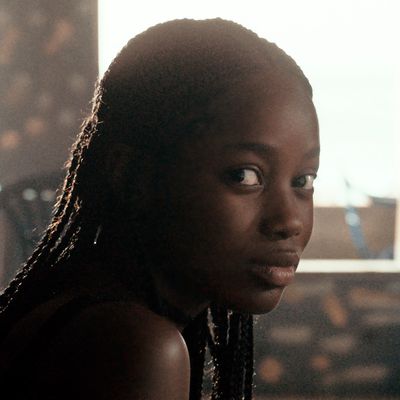
One night in Dakar, a teenage girl named Ada sneaks out of the house to meet her boyfriend, Sulieman, at a club. She’s supposed to get married soon, to an older man her parents have chosen for her, and this night might be the last they have together. As Ada waits for Sulieman at the bar, she has an unsettling realization: The club is full of women, and each of them is waiting for a guy, too. The men are all gone. They’ve taken a boat to Spain, and they might not survive the voyage.
That half-empty club is the first indication that Mati Diop’s Atlantics, which premiered to a lengthy standing ovation at Cannes on Thursday, has something a little more spooky in store than its love-triangle setup might indicate. The second comes at the wedding, which Ada (Mame Bineta Sane) has been forced to go through with, even though her heart’s clearly not in it. But on the fateful night, the celebration is interrupted — someone’s set fire to the marital bed. Examining the scene the next morning, the police find nothing that could have sparked a flame. Then a few of the girls from the club start getting sick, as does one of the detectives. The boys’ boat turns up in the ocean, capsized. There are supposedly no survivors … but then why did Ada’s friend say she saw Sulieman hanging around the scene at the wedding?
The answer turns out to be rooted in Islamic folk beliefs, and though Atlantics at times has the vibe of a ghost story, ghosts are the least of Ada’s problems. She’s trapped in a world created by and for the benefit of rich men, where young brides are forced to undergo “virginity tests,” cops brush off a case of large-scale wage theft, and a young woman without a husband will be left all alone. In Diop’s telling, vengeful spirits are far less frightening than the patriarchy.
Throughout, Diop keeps cutting to the waves of the Atlantic, a wide, surging mass that seems to contain all manner of deadly secrets. The ocean is both the escape to a better life and the wall keeping Ada in place. It’s a subject the filmmaker explored in her 2009 documentary short of the same name, in which a group of Senegalese men discussed whether or not they’d migrate. Atlantics is Diop’s first feature; it is also, somewhat depressingly, the first film directed by a black woman to compete in the main lineup at Cannes. But her first time could not have gone any better.
On Thursday at the Lumiere, the crowd started applauding before the end credits had even begun to roll, and did not stop for a long while. Outside afterwards, Sane and the rest of the cast seemed to be instant movie stars. Diop strolled down the Croisette with her mentor, Claire Denis. There wasn’t a baton, but there could have been.


